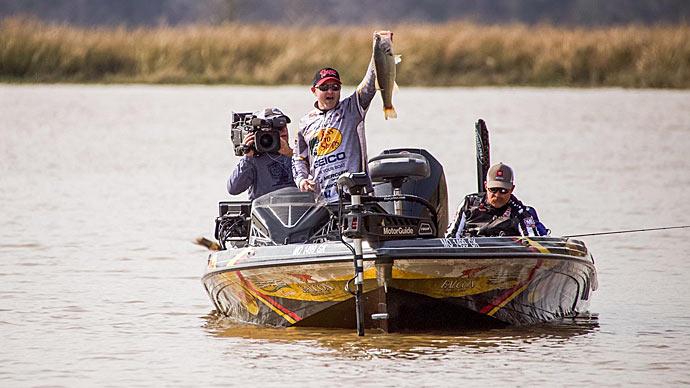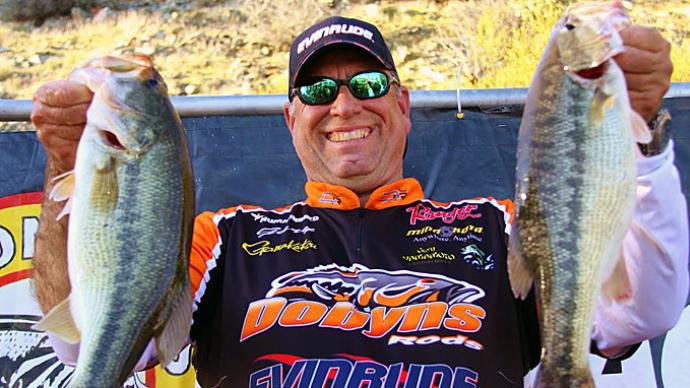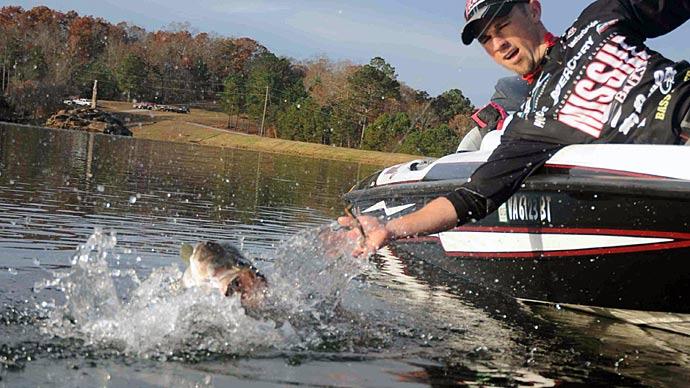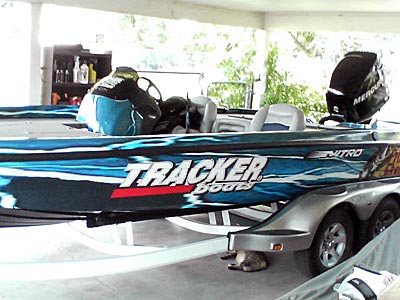
Andrew Napoleon of Phoenix is a long-time tournament fisherman, sponsor, and supporter of many other tournament fishermen. He spent ten years in the U. S. Marines and served in the Gulf War. He was attached to the British Royal Marines. “We lost some guys to friendly fire,” he says, so they decided to paint the tops of the vehicles. But the absorbent steel wouldn’t let the paint stick – it turned out dull and hard to see. Then one day, a guy from 3M showed up and wrapped the tops so they were visible. That saved lives, Andrew said.
Fast forward to Andrew coming home. He had been in heavy equipment doing demo, but when he got home, he couldn’t find work. One day while looking for a job, he saw a guy on the side of the road putting huge vinyl decals on a big rig, and he realized that it was the same stuff they had been putting on tank turrets in the war. So he pulled over and asked the guy if he could get some training. The guy said, “Son if you can take orders, I can train you.” His years in the Marines had undoubtedly taught him to take orders, so his journey toward owning A&M Graphics began just like that.
He said it was a rocky road – he knew nothing and made every possible mistake. After about ten years, he was introduced to bass fishing, and his first boat wrap was Nitro Pro Matt Shura’s boat. He had been missing the camaraderie of the Marines, but bass fishing gave that back to him. In those days, the wrap wasn’t designed to come off, so when it came time to change it, it was a colossal effort. He’s been doing wraps for around twenty-five years and has done more boat wraps in Arizona than any other company.
Wrapping your boat does more than promote your sponsors. You don’t need sponsors to want to wrap your boat. The vinyl protects the surface from hard water spots, scratches, and damage. It’s easy to clean, and you can either bring the design to your wrapper, or they can design one for you. The sky is the limit – you can put anything on vinyl and wrap your boat. Boats flex, but so does the vinyl, so your boat always looks good.
Not just boats that benefit from wrapping – your tow vehicle can also be protected and decorated by a wrap. That wrap will increase the resell value because when you take it off, the original finish will look as good as the day you wrapped it. Out here in Arizona, it seems like everything that grows has thorns on it, which means that almost every truck that goes off-highway has what we refer to as “Arizona Pinstripes” – those little scratches that liberally cover the sides of the truck where the bushes and trees brush against it as you negotiate the dirt roads. But those little scratches on the two mil vinyl can be healed by heat. Heat guns are used to apply the wrap, and heat can also be used to heal it.
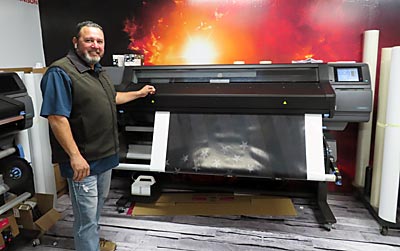
Almost anything can be wrapped. Andrew is doing a helicopter right now, and he has put a wrap on trucks, cars, RVs, trailers, 18-wheelers, walls, floors, counters, tables – almost any surface. Andrew says the cost to wrap a bass boat is around $2400, and he does quite a few boats with no sponsor logos. You can give him a sketch or a photo, and they go to work putting it in layers on a computer so you can change, add, or remove things until the design is perfect. He says engine cowling wraps are particularly popular now, and a wrap can make your motor look brand new. He says they can design and print it if you can imagine it. He also makes signs, banners, and things like that.
Andrew’s Adventure At The U.S. Open
Before the Open, everything that could go wrong for Andrew did go wrong. He lost his boat, so he had to borrow one, which had battery problems, so he had no electronics. On Mead, that is crucial. He was fishing blind. Then, he was transferring his tackle to the borrowed boat on the Sunday night before the Monday start. It had been stored at Roosevelt, and unbeknownst to him, a spider had made its home in the boat. It bit him on the left elbow.
He didn’t realize at the time that he had even been bit. His arm just started hurting. By morning his elbow was as big as a grapefruit. He wrapped it up and went to the start. He’s left-handed, and by the end of the day, he couldn’t use his arm. Matt Shura, a paramedic, told him he shouldn’t get any of the lake water on the arm, which had an open wound on it by then. So he kept it wrapped up and depended on his co-anglers to help him.
All of his co-anglers were professional and polite, he said. They operated the boat, handled all of the fish, and never complained about not having any electronics. They were terrific guys, he said. The tournament officials told him they couldn’t let him go back out if he didn’t get it checked, so he went to the ER, and that’s when he discovered a Brown Recluse spider had bitten him.
“It’s such a tribute to the fishing industry the way everyone helped me,” Andrew says. “When I got in my boat the second day, my co-angler had set the alarm so he could remind me to take my medicine.” His strong arm out of the picture forced him to do things he would never have done otherwise. It made him slow way down and drag his baits methodically. He fished places he wouldn’t have if he’d had electronics and two good arms. He cashed a $7000 check from the Open.
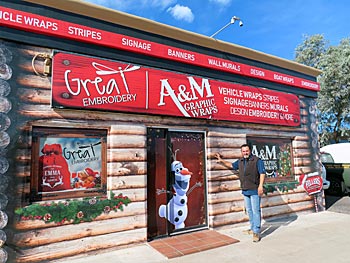
His co-anglers taught him a lot, he says, and so did having to slow down. At one point, his co-angler had a backlash, so his jig was sitting on the bottom, not moving. A giant smallmouth was on it when they finally got it moving again. The bass got off, but it taught them what to do. This Open experience taught him never to give up. It also taught him how tight the brotherhood of fishermen is.
“Patch Pirates”
In the early days, bass pros had vests they sewed their sponsors’ patches onto. Or they sewed them to their shirts. They also wore their sponsor’s hats. They were soon getting their sponsors’ logos professionally embroidered on their crisp button-down shirts. In those days, too, you could buy patches from Bass Pro Shops, or companies like Stren would give them away. So regular guys started sporting patches from their favorite companies.
Somewhere along the line, the term “Patch Pirate” was spawned, and it refers to a guy (or gal!) who wears logos with the intent to make people think that those companies sponsor them. Such people are treated with disdain and the term “Patch Pirate” is undoubtedly derogatory. But what exactly qualifies as Patch Piracy? Almost everyone I know who fishes has a slew of hats with fishing company logos on them. Certainly, nobody thinks you’re a Patch Pirate for wearing a hat.
Today, tournament bass pros have logos plastered all over their trucks and boats and even the carpets of their boats. Not only that, but most tournament fishermen wear jerseys, their sponsors’ logos are printed right on the jersey, and their names are on the front and back. If you don’t have sponsors, are you a Patch Pirate if you wear a jersey? What if you are an avid tournament angler and want to let people know which products you particularly like? Almost every prominent fishing manufacturer has a place on their website where they sell shirts, hats, jackets, towels, visors, can cozies – you name it – but wearing one doesn’t make you a Patch Pirate in my book. In my opinion, it’s all about intent. If I wear a Yamamoto T-shirt, I like their baits, not because I’m trying to make people think they sponsor me.
The S-word (sponsor) opens yet another can of worms. What does it mean to be sponsored? Some say you can’t call them a sponsor unless they pay your entry fees or give you cash. What about the companies that give you free baits or a discount on baits or services? Does that entitle you to wear their logo on a jersey? The questions get trickier and trickier.
One of the most controversial posts I’ve ever made on Facebook was one on a vast fishing page in Arizona. I asked, “what is your definition of a Patch Pirate?”. Wow. It soon devolved into the question of what a “professional bass fisherman” is. Opinions were all over the place. Is a “pro” a guy who makes his entire living from fishing and promoting fishing, or does fishing major tournaments and still having a day job qualify you? If it means that all your income comes from fishing or promoting, there aren’t many actual pros out there. I’d love to hear your opinions on these questions. Just keep it civil.


